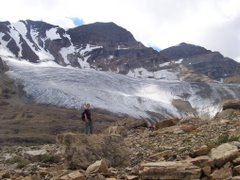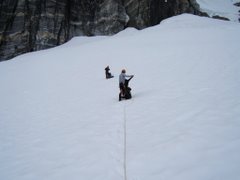Yesterday, I heard the most fantastic talk on nitrate! And it ties in well with a previous post this week on wetlands (the great filters and transformers of human derived pollutants). First, some background: nitrogen in our atmosphere is fixed by microbes and then utilized by all forms of life. It is an essential fertilizer. However, the burning of fossil fuels and our use of fertilizers for agricultural and other things have overwhelmed the natural nitrogen cycle. This is primarily indicated by the surplus of nitrate (for instance, in the Mount Hood Snow I collected a few summers ago, there was clearly enrichments in nitrate from fossil fuel burning). Humans presently dominate the earth's major geochemical cyles- (Vitousek and others, 1997)
Dr. Bill Showers from North Carolina State University is studying nitrate in the Neuse River Basin, NC. Bill's research group studied runoff from an area where biosolids (or the end-product of wastewater management) are applied on soils. (They know exactly how much nitrate is in these biosolids). The surprising results: groundwater, not not surface runoff, contribute most of the nitrate to the Neuse River.
Bill and his group also found that the locations where nitrate-rich biosolids were applied showed little relation to the nitrate in the stream water. The stronger control on stream chemistry was the type of soil. Water-loving soils retained the most nitrate, keeping it from reaching the streams. So, Bill and his team are going to engineer wetlands to create hydric soils and measure their capacity to retain nitrate and improve stream water quality......
The biggest, scariest conclusion of Bill's talk was that by 2050 fertilizer, sludge, wastewater, and even groundwater are going to pale in comparison to atmospheric nitrate flux. This is very, very bad for us with the nitrate concentrations in many watersheds already reaching toxic levels (think- blue baby syndrome).
Subscribe to:
Post Comments (Atom)



No comments:
Post a Comment